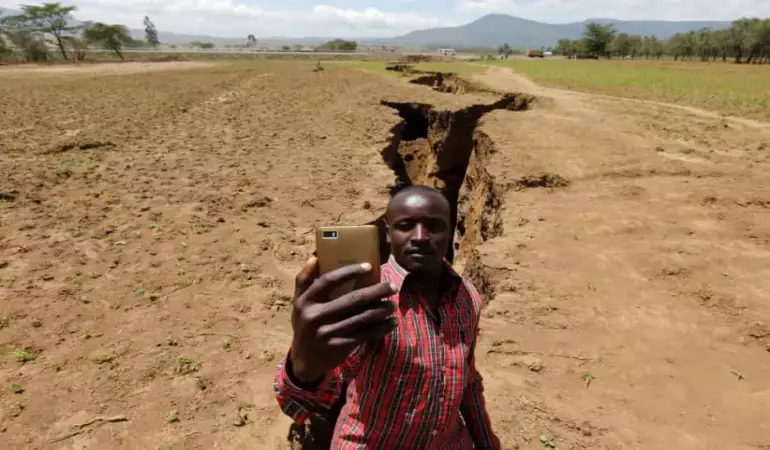Earth's sixth ocean is forming: Africa splits in two
Since 2005, a geological miracle has been quietly unfolding in the dry deserts of Ethiopia - a 56-kilometre-long fissure known as the East African Reef. Far from being a curiosity-raising phenomenon, the East African Reef has the potential to drastically change the geography of our planet and become the Earth's sixth ocean.
February 05, 2025 07:01
What causes the continent to secede?
Tectonic plates - massive segments of the Earth's crust moving on top of a semi-fluid mantle - cause this phenomenon.
These plates have shaped the planet's surface over millions of years, causing continents to form and break apart.
The East African Rift is particularly important because of its scale and potential consequences.
The Somali tectonic plate is gradually separating from the Nubian tectonic plate, replicating the dramatic separation of South America and Africa that began hundreds of millions of years ago.
This gradual change is well documented. An international study examines the dynamics of this tectonic separation and shows that the plates are moving apart by just a few millimetres per year. Although slow, this process is undoubtedly a changeable one.
Ethiopia and Uganda could offer significant growth opportunities
This phenomenon has particularly important implications for Africa.
In the long term, the rift could lead to the formation of a vast new ocean, flooding the Afar region and the East African Rift Valley with water from the Red Sea and Gulf of Aden.
"This part of East Africa will become a continent in its own right," says marine geophysicist Ken Macdonald, professor emeritus at the University of California (USA).
This process could not only have geological implications but also change the socio-economic structure of the region.
For landlocked countries such as Ethiopia and Uganda, the emergence of coastlines would open up unprecedented opportunities for trade and economic growth. This would make them major players in global trade.
In addition, the creation of new ports and trade routes could boost regional development, bringing wealth and infrastructure to areas that have long faced economic hardship.
We are unlikely to see this transformation
While it is unlikely that the next generations of humanity will see this transformation, such changes are a testament to the dynamic nature of our planet and its constant evolution.
The East African Reef is more than a crack in the desert. It's a glimpse into the Earth's tectonic future and a reminder of the profound forces shaping our world.
It is estimated that the complete separation of the African continent and the formation of a new ocean is likely to take another 5-10 million years.




